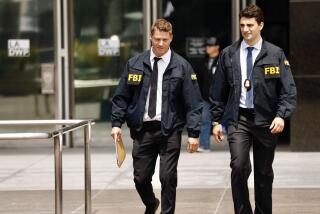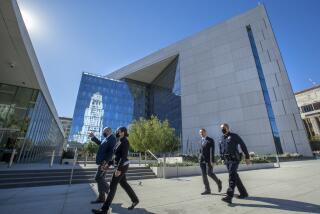Lockyer Admits to Lunch With Getty’s Ex-Chief
While he was under investigation by the state attorney general’s office for financial improprieties, former J. Paul Getty Trust Chief Executive Barry Munitz turned to a close friend for consolation — Atty. Gen. Bill Lockyer.
California’s top law enforcement official acknowledged this week that he and Munitz had met in mid-January for lunch, during which the embattled Getty administrator confided that he intended to quit his $1.5-million-a-year job because of a growing controversy over his use of the nonprofit’s resources for personal benefit.
Faced with mounting evidence against him, Munitz resigned a month later, agreeing to forgo more than $2 million promised in his contract and reimburse the Getty $250,000 to resolve “continuing disputes.”
Lockyer’s disclosure, made in response to questions from The Times, comes as his charitable trust division is about to release a report on its yearlong investigation of the $5.5-billion arts nonprofit.
The attorney general’s office regulates all nonprofits doing business in California and can impose civil penalties, remove trustees or recommend the revocation of an organization’s tax-exempt status if it discovers gross mismanagement or fraud.
Lockyer, who is running for state treasurer in November, said that the Jan. 13 meeting with Munitz at Rocket Pizza, a downtown Los Angeles restaurant, might look inappropriate. But there was no talk about the probe during the lunch, which was arranged on short notice at the Getty chief’s request, he said. Lockyer added that the get-together did not violate his unwritten policy of not meeting alone with targets of an investigation because the probe was not discussed.
“This was, in my mind, lunch with a personal friend that I’ve known for a long time and it didn’t have anything to do with the case,” he said. “I can understand how someone could say the appearance was bad. But, hey, he’s my friend.
“I was being a good listener, kind of consoling him as he leaves a job that he loves,” said Lockyer, characterizing the discussion, which eventually shifted to books and movies, as “therapy with a friend.”
Munitz did not respond to an e-mail requesting an interview.
Experts in government ethics said that though Lockyer broke no laws in meeting with Munitz, it was “not wise” and a “mistake” for him to meet alone with the target of an investigation, no matter how casual or innocent the occasion.
“If the report comes out and the A.G.’s office says there are no problems at the Getty, the question will be: What part did Lockyer have in it?” said Robert Stern, director of the Center for Governmental Studies in Los Angeles. “You’ll always have a perception problem.”
Robert Fellmeth, director of the Center for Public Interest Law at the University of San Diego, said that Lockyer showed “bad judgment” by meeting with Munitz because the morale of his deputies and investigators working on the case could be affected.
“They can say, ‘Wait a minute. The boss is meeting with this person. What do I do now?’ ” Fellmeth said.
Lockyer’s office launched an investigation of Munitz last summer, after The Times reported that the Getty executive had made grants to friends, demanded a raise amid cost-cutting, traveled lavishly at the nonprofit’s expense and used staff to perform personal errands.
Belinda Johns, the senior assistant attorney general in charge of the charitable trust division, and James Cordi, a 33-year veteran who oversaw the Getty probe, said they didn’t know about the lunch but were unconcerned when they were told about it Monday.
“He has never interfered with one of our investigations, and that’s really the bottom line,” Johns said. “In the last 7 1/2 years, Lockyer has never not agreed with something we wanted to do so I don’t think that lunch is going to have any effect on the outcome of the investigation.”
In the meantime, records and interviews show that Munitz wasn’t the only Getty representative Lockyer had contact with during his office’s probe.
The attorney general said he had two private telephone discussions with attorney Ronald Olson, whose firm was hired by the Getty board, Munitz’s bosses, to conduct an internal review and represent the nonprofit’s interest during the attorney general probe.
Lockyer said Olson called him last fall to announce that Munger, Tolles & Olson had been hired and “would be happy” to pass along any documents the attorney general’s investigators needed.
The second call came Feb. 10, when Olson told the attorney general that Munitz had resigned. Both exchanges were “courtesy calls,” lasting only a few minutes, Lockyer said.
A more detailed, face-to-face meeting of Olson, Lockyer and their respective associates was arranged for Feb. 14, but the attorney general said he became ill and did not attend, although his staff was present.
Olson confirmed that he had asked for the meeting with Lockyer as an “opportunity to explain our findings” from the internal probe.
A prominent figure in legal and political circles, Olson said he knows the attorney general only professionally and has met with him on legal matters about six times since Lockyer was elected in 1998.
Records show that Olson contributed $1,000 to Lockyer’s first campaign and $1,000 for his 2002 reelection.
The two lawyers squared off in 2001 over litigation during the California energy crisis, in which Olson represented Southern California Edison.
Lockyer’s relationship with Munitz is more personal.
In an initial interview last week, the attorney general said he has been a “friend and admirer” of Munitz for many years, but did not mention their January meeting. His staff later reported the meeting, and Lockyer elaborated on the relationship in a second interview this week.
Munitz and Lockyer met during the mid-1990s, when Lockyer was Senate President Pro Tem and Munitz was president of California State University.
Lockyer said he was impressed when Munitz arrived at his office toting charts to support an analysis that a glut of state-financed prison construction was hurting higher education funding and “cannibalizing our kids’ future.”
“He was quite passionate about how wrong that was,” recalled Lockyer, who said he adopted Munitz’s arguments and used them in high-level budget talks with then-Gov. Pete Wilson.
Lockyer sought political advice from Munitz in August 2004, when the attorney general was considering a run for governor. Munitz, who by then was running the Getty, suggested that the veteran Northern California politician get in touch with Los Angeles power elites.
Although he did not recall the case being discussed at the January meeting, Lockyer said it is typical in any investigation “for the people being looked at to say, ‘Gee, I wish this would get done and be over.’ That is a very common thing.”
Lockyer acknowledged that he had more than once asked his staff to speed up the investigation. He added that he saw no reason to recuse himself from the matter.
Asked if he felt awkward about meeting with Munitz while his staff was investigating him, Lockyer said: “I can separate my personal feelings from the requirement to do the job, so I don’t mind talking to Barry Munitz myself, and being involved in some subsequent disciplinary action if necessary. I can do those things. It’s part of what goes with the job of any prosecutor.”
More to Read
Sign up for Essential California
The most important California stories and recommendations in your inbox every morning.
You may occasionally receive promotional content from the Los Angeles Times.










